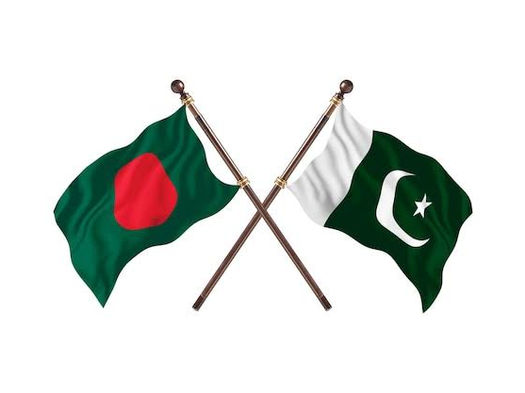Bangladesh’s evolving political and strategic dynamics have taken a surprising turn with recent developments signaling a warming of ties with Pakistan. The arrival of a cargo vessel from Karachi at Bangladesh’s Chittagong Port on Wednesday marked a historic milestone: the establishment of a direct maritime link between the two nations. This development comes amid a shift in Bangladesh’s political landscape following the end of Sheikh Hasina’s 15-year tenure as Prime Minister, raising questions about the country’s regional alliances and strategic priorities.
What Has Happened?
Historic Maritime Connection
The direct maritime link between Bangladesh and Pakistan was inaugurated as a cargo vessel from Karachi docked at Chittagong Port. This marks the first-ever direct shipping route between the two countries.
- Details of the Shipment:
The vessel carried goods with a capacity of approximately 2,300 TEUs (Twenty-foot Equivalent Units), according to The Dhaka Tribune. - Statements from Pakistan’s High Commissioner:
Syed Ahmed Maroof, Pakistan’s High Commissioner to Bangladesh, emphasized the significance of this development. He described it as a “major step forward” in enhancing bilateral trade and fostering economic integration in the region.- Maroof proposed further expanding direct maritime transport to solidify “eco-social relations” between the two nations.
Shift in Defence Strategy
Simultaneously, Bangladesh’s defence strategy is witnessing a notable shift, with the country ramping up its procurement of ammunition and explosives from Pakistan.
Details of the Defence Deal
Bangladesh has significantly increased its defence imports from Pakistan’s Ordnance Factories (POF).
- Recent orders include:
- 40,000 rounds of ammunition.
- 2,000 units of tank ammunition.
- 40 tons of RDX explosives.
- 2,900 high-intensity projectiles.
- Comparison to Previous Year:
The current order represents a substantial escalation compared to last year’s procurement of 12,000 rounds of ammunition.
Strategic Implications
This shift signals a potential realignment in Bangladesh’s military alliances, raising concerns in India, which has traditionally enjoyed strong diplomatic and defence ties with Dhaka under Sheikh Hasina’s leadership.
Why Does It Matter?
Regional Dynamics
Bangladesh’s pivot toward Pakistan is particularly significant in the context of regional geopolitics.
- Bangladesh’s Neutral Stance: Historically, Bangladesh has balanced its relationships with India and China.
- Challenges to India’s Influence: The strengthening of Bangladesh-Pakistan ties could undermine India’s strategic position in South Asia, especially as anti-India sentiments grow in Bangladesh.
Rising Anti-India Sentiment in Bangladesh
Recent incidents have fueled anti-India sentiment:
- Floods in Feni: Many Bangladeshis blamed India for releasing dam water from Tripura without prior notice, exacerbating local hardships.
- Visa Protests: In August, protests erupted outside the Indian Visa Application Centre in Satkhira, highlighting frustrations over visa delays.
Also Read: ISKCON Under Attack in Bangladesh: A Call for Justice and Equality
Historical Shadows: The 1971 Liberation War
The warming of Bangladesh-Pakistan relations is unfolding against the enduring legacy of the 1971 Liberation War.
A Painful History
During Bangladesh’s nine-month struggle for independence, Pakistan’s military committed atrocities, resulting in:
- The deaths of an estimated 3 million people.
- Thousands of cases of rape and torture.
- Millions of refugees fleeing to India.
Pakistan’s Refusal to Apologize
Pakistan has yet to issue an apology for its actions during the war.
- Bangladesh’s Perspective: The lack of acknowledgment remains a significant obstacle to improved relations.
- Pakistan’s Narrative: Islamabad frames the war as an Indian conspiracy rather than an uprising of oppressed people.
Expert Insights
Political scientist Ali Riaz noted in 2021:
“A better relationship requires Pakistan’s initiative to address the 1971 war, especially the genocide perpetrated by the army… An unconditional public apology from Pakistan is long overdue.”
Implications for India
India’s concerns are twofold:
- Geopolitical Influence: The strengthening of Bangladesh-Pakistan ties could reduce India’s leverage in South Asia.
- Defence Cooperation: Bangladesh’s growing defence collaboration with Pakistan, a traditional rival of India, may signal a shift in regional power dynamics.
Also Read: Protests Erupt in Bangladesh: Calls for President Shahabuddin’s Resignation Intensify
The Road Ahead
Challenges to Reconciliation
While economic and defence cooperation may grow, historical wounds like the 1971 Liberation War remain a barrier to a full rapprochement.
Balancing Act for Bangladesh
As it navigates a post-Hasina era, Bangladesh must carefully balance its relationships with India, Pakistan, and other regional powers to safeguard its strategic interests.
Conclusion
Bangladesh’s evolving relationship with Pakistan marks a turning point in South Asian geopolitics. The direct maritime link and increased defence imports indicate a willingness to deepen ties, despite the unresolved legacy of 1971. While these developments present opportunities for economic and strategic cooperation, they also raise complex questions about regional balance, historical accountability, and the future of India-Bangladesh relations.
Follow US





